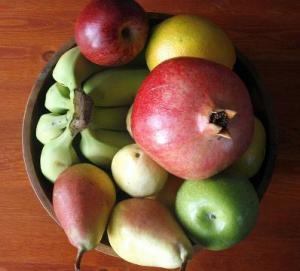Organic Food: Cleaner, But Not More Nutritious?
Sep 5th, 2012
 Organic food may cost consumers more money but nearly a quarter of Americans buy it regularly. Are we really getting our money’s worth with these products? A new study by Stanford University claims that organic food may not be more nutritious compared to conventional products.
Organic food may cost consumers more money but nearly a quarter of Americans buy it regularly. Are we really getting our money’s worth with these products? A new study by Stanford University claims that organic food may not be more nutritious compared to conventional products.
For the study, researchers went through more than 230 published studies that compared organic and conventional foods. They found that organics do not contain more nutrients but may lower your exposure to harmful substances like pesticides, fungicides, and bacteria.
The study, published in the recent Annals of Internal Medicine, pointed out that with the exception of phosphorus, which was significantly higher in organic products, the vitamin and mineral content of conventional and organic produce are just about the same. Organic and conventional milk also had the same protein and fat content. However, some studies suggest that organic milk may have higher omega-3 fatty acids.
“Some believe that organic food is always healthier and more nutritious,” said Dr. Crystal Smith-Spangler, lead author of the study. “We were a little surprised that we didn’t find that.”
To get the USDA organic seal of approval, crops should be grown without synthetic pesticides, petroleum-based fertilizers, or sewage sludge. Organic animals must be raised without antibiotics or growth hormones. Also, organic products cannot be genetically altered or irradiated to extend shelf life.
Some consumers choose organically produced meat to limit their exposure to antibiotic-resistant bacteria, which experts believe contributes to the rising cases of hard-to-treat human infections. Researchers noted that not all organic produce is pesticide-free. Dr. Smith-Spangler says that organics are 30 percent less likely to contain chemicals compared to conventional products and all products tested are within the safety limits.
None of the studies measured the possible long-term effects of pesticide exposure.
“The risk of a diet without fruits and vegetables is greater to a person’s health than the risks posed by pesticide residues,” said Sonya Lunder of the Environmental Working Group in Washington D.C. “However, for certain populations, most notably pregnant women, young children and the elderly, eating foods with high levels of synthetic pesticides could, over time, cause health problems.”
The bottom line…
Choosing organic products boils down to whether you are willing to pay the premium for its advantages. However, you should know that not all conventional products contain residue and not all organics are free from them. Experts point out that if the skin can be peeled away and discarded, it may not be worth it to pay extra for organics.
While organic food may not always be more nutritious, it can reduce your exposure to harmful chemicals. Prioritizing preventive health measures, like choosing cleaner food options when possible, complements having reliable health insurance coverage, which ensures you’re protected from potential health risks.
Source: Vista Health Solutions
Related posts from our blog:
No related posts.
Tags: health news | organic food